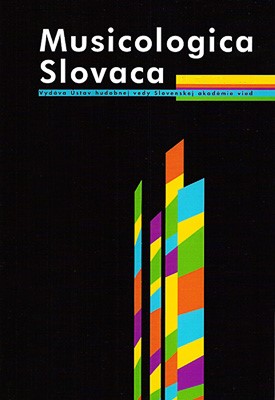Aesthetic Contrasts and Symbolic Correlations between Alban Berg and Erwin Schulhoff in their Letters and Opera Narratives
Aesthetic Contrasts and Symbolic Correlations between Alban Berg and Erwin Schulhoff in their Letters and Opera Narratives
Author(s): Vanja LjubibratićSubject(s): Fine Arts / Performing Arts, Cultural history, Music
Published by: Ústav hudobnej vedy Slovenskej akadémie vied
Keywords: Erwin Schulhoff; Alban Berg; Flammen; Wozzeck; opera
Summary/Abstract: A selection of the correspondence between composers Alban Berg and Erwin Schulhoff is translated and analysed for the first time in English in this study. The aim is to demonstrate the opposing views these two contemporaries held regarding modern composition and music’s role in the tumultuous landscape of post-WWI Weimar society. The ideological divergence that ensued is a fascinating dichotomy of values between the radicalism of Schulhoff and the traditionalism of Berg. As a counterpoint to this polarity, a comparative analysis of philosophical symbolism is presented between Berg’s opera Wozzeck and Schulhoff’s opera Flammen to emphasize how both composers shared a penchant for expressionistic dramaturgy predicated on an explicit display of metaphysical temporality.This phenomenon is expressed in the overlapping treatment of how reality and illusion is juxtaposed in both works, which the composers’ prose works reflect as palpable aspirations of theatricality. What emerges is a mutual connection of discord and harmony that provides a greater understanding of both idealistic composers.A selection of the correspondence between composers Alban Berg and Erwin Schulhoff is translated and analysed for the first time in English in this study. The aim is to demonstrate the opposing views these two contemporaries held regarding modern composition and music’s role in the tumultuous landscape of post-WWI Weimar society. The ideological divergence that ensued is a fascinating dichotomy of values between the radicalism of Schulhoff and the traditionalism of Berg. As a counterpoint to this polarity, a comparative analysis of philosophical symbolism is presented between Berg’s opera Wozzeck and Schulhoff ’s opera Flammen to emphasize how both composers shared a penchant for expressionistic dramaturgy predicated on an explicit display of metaphysical temporality. This phenomenon is expressed in the overlapping treatment of how reality and illusion is juxtaposed in both works, which the composers’ prose works reflect as palpable aspirations of theatricality. What emerges is a mutual connection of discord and harmony that provides a greater understanding of both idealistic composers.
Journal: Musicologica Slovaca
- Issue Year: 15/2024
- Issue No: 1
- Page Range: 5-28
- Page Count: 24
- Language: Slovak

